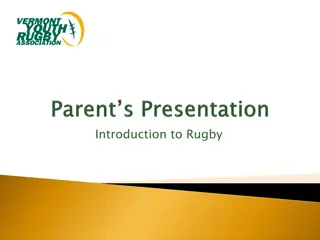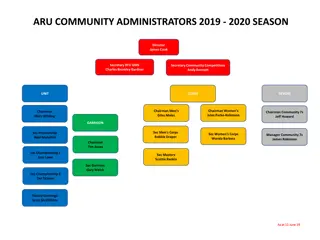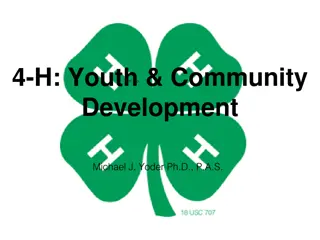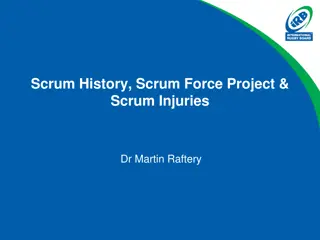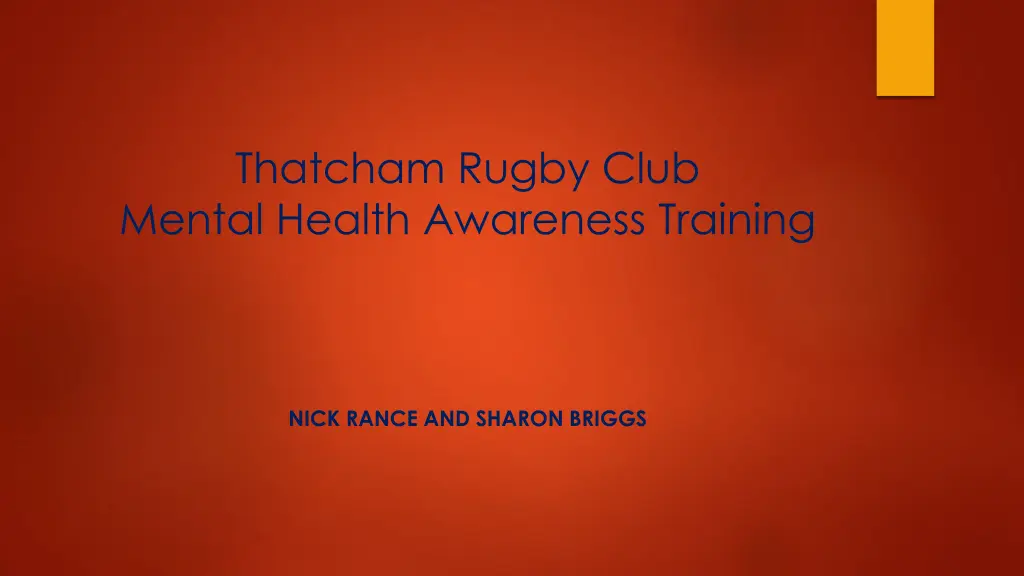
Understanding Mental Health and Rugby Awareness Training
Discover the importance of mental health awareness in rugby clubs, the connection with physical health, and the impact on young people. Learn about the Mental Health Charter for Sport and Recreation, latest suicide statistics, and the prevalence of mental health issues. Let's talk openly to create a supportive environment for everyone.
Download Presentation

Please find below an Image/Link to download the presentation.
The content on the website is provided AS IS for your information and personal use only. It may not be sold, licensed, or shared on other websites without obtaining consent from the author. If you encounter any issues during the download, it is possible that the publisher has removed the file from their server.
You are allowed to download the files provided on this website for personal or commercial use, subject to the condition that they are used lawfully. All files are the property of their respective owners.
The content on the website is provided AS IS for your information and personal use only. It may not be sold, licensed, or shared on other websites without obtaining consent from the author.
E N D
Presentation Transcript
Thatcham Rugby Club Mental Health Awareness Training NICK RANCE AND SHARON BRIGGS
Why Are We Here? To Talk About Mental Health In many ways, mental health is just like physical health: everybody has it and we need to take care of it. Good mental health means being generally able to think, feel and react in the ways that you need and want to live your life. But if you go through a period of poor mental health you might find the ways you're frequently thinking, feeling or reacting become difficult, or even impossible, to cope with. This can feel just as bad as a physical illness, or even worse. 1 in 4 people have a mental health problem, if we look at how many people are part of Thatcham Rugby Club on average that means around could be struggling with a mental health issue.
Mental Health Charter The Charter sets out how sport and recreation organisations should adopt good mental health practice to make activities inclusive, positive and open to everyone. One in four of us will experience a mental health problem every year. Yet it is still something people are worried to talk about or ask for help. This must change and physical activity can play a massive part. We know that being physically active can help mental wellbeing. That's why the Sport and Recreation Alliance, the Professional Players Federation and the mental health charity Mind created the Mental Health Charter for Sport and Recreation. Our vision is that the Mental Health Charter for Sport and Recreation has played an instrumental role in embedding mental health within the sport and recreation sector and helped create a culture shift in wider society that removes the stigma around mental health.
Latest Stats from the Samaritans In 2017 there were 6,213 suicides in the UK and Republic of Ireland. 5,821 suicides were registered in the UK and 392 occurred in the Republic of Ireland. In the UK men remain three times as likely to take their own lives than women, and in the Republic of Ireland four times more likely. The highest suicide rate in the UK was for men aged 45-49. The highest suicide rate in the Republic of Ireland was for men aged 25 34 (with an almost identical rate for men aged 45 54). There has been a significant decrease in male suicide in the UK, and the male suicide rate is the lowest in over 30 years.
What About Our Young People? Mental health is a big issue for young people 1 in 10 children have a diagnosable mental health disorder that s roughly 3 children in every classroom (i) 1 in 5 young adults have a diagnosable mental health disorder (ii) Half of all mental health problems manifest by the age of 14, with 75% by age 24 (iii) Almost 1 in 4 children and young people show some evidence of mental ill health (including anxiety and depression) (iv) In 2015, suicide was the most common cause of death for both boys (17% of all deaths) and girls (11%) aged between 5 and 19. (v) 1 in 12 young people self-harm at some point in their lives, though there is evidence that this could be a lot higher. Girls are more likely to self- harm than boys. (vi)
What Can You Do?How do I know if someone has a mental health problem? Sometimes it will seem obvious when someone is going through a hard time, but there is no simple way of knowing if they have a mental health problem. Sometimes you don t need to know. It s more important to respond sensitively to someone who seems troubled than to find out whether or not they have a diagnosis. Although certain symptoms are common with specific mental health problems, no two people behave in exactly the same way when they are unwell. If you know the person well, you may notice changes in their behaviour or mood.
Signs Signs of anxiety Signs of depression People experiencing anxiety may: People who are depressed may: have difficulty concentrating have low confidence be irritable lose interest in activities they normal enjoy try to avoid certain situations lose their appetite appear pale and tense get tired easily be easily startled by everyday sounds. be tearful, nervous or irritable. At worst they may feel suicidal.
Language - Banter The original definition of banter is the playful and friendly exchange of teasing remarks . That males in particular find this amusing is nothing new, and in some respects taking the mickey out of one another might be considered quintessentially British and part of the sports club environment. Of course we are not going to ask you to stop taking the mickey out of one another. We just want to get across that banter is only banter if both people find it funny and that it was just banter. Everyone has a different tolerance to banter, and that your antennae must be alert to signs of discomfort in your friends and teammates.
Drinking Culture Alcohol has been described as the UK s favourite coping mechanism , and many of us do drink to help manage stress, anxiety, depression or other mental health issues Drinking Is there pressure to drink? Man of the Match Is it a reward? How many young players come into the clubhouse? Research shows greater proportion of 16- to 24-year-olds shunning alcohol entirely. They studied data from the annual health survey for England and found the proportion of 16- to 24-year-olds who do not drink alcohol had increased from 18% in 2005 to 29% in 2015. Binge- drinking rates also dropped from 27% in 2005 to 18% in 2015.
What Can You Do? Eight tips for talking about mental health 1. Set time aside with no distractions It is important to provide an open and non-judgemental space with no distractions. 2. Let them share as much or as little as they want to Let them lead the discussion at their own pace. Don t put pressure on them to tell you anything they aren t ready to talk about. Talking can take a lot of trust and courage. You might be the first person they have been able to talk to about this. 3. Don't try to diagnose or second guess their feelings You probably aren t a medical expert and, while you may be happy to talk and offer support, you aren t a trained counsellor. Try not to make assumptions about what is wrong or jump in too quickly with your own diagnosis or solutions. 4. Keep questions open ended Say "Why don t you tell me how you are feeling?" rather than "I can see you are feeling very low". Try to keep your language neutral. Give the person time to answer and try not to grill them with too many questions.
What Can You Do? 5. Talk about wellbeing Exercise, having a healthy diet and taking a break can help protect mental health and sustain wellbeing. Talk about ways of de-stressing and ask if they find anything helpful. 6. Listen carefully to what they tell you Repeat what they have said back to them to ensure you have understood it. You don t have to agree with what they are saying, but by showing you understand how they feel, you are letting them know you respect their feelings. 7. Offer them help in seeking professional support and provide information on ways to do this You might want to offer to go the GP with them, or help them talk to a friend or family member. Try not to take control and allow them to make decisions. 8. Know your limits Ask for help or signpost if the problem is serious. If you believe they are in immediate danger or they have injuries that need medical attention, you need to take action to make sure they are safe. More details on dealing in a crisis can be found below.
Club Support Useful Phone Numbers on noticeboard Club Officials Nick Rance Club Captain 07894106663 MHFA Trained Sharon Briggs Trustee ______________________ MFHA Trained Its Good to Talk


